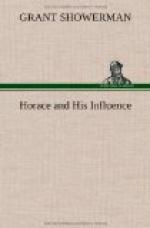And if Horace did not always conceive of his inspiration as purely ethereal, neither did he always dream of the path to immortality as leading through the spacious reaches of the upper air. At forty-four, he is already aware of a more pedestrian path. He has observed the ways of the public with literature, as any writer must observe them still, and knows also of a certain use to which his poems are being put. Perhaps with some secret pride, but surely with a philosophic resignation that is like good-humored despair, he sees that the path is pedagogical. In reproachful tones, he addresses the book of Epistles that is so eager to try its fortune in the big world: But if the prophet is not blinded by disgust at your foolishness, you will be prized at Rome until the charm of youth has left you. Then, soiled and worn by much handling of the common crowd, you will either silently give food to vandal worms, or seek exile in Utica, or be tied up and sent to Ilerda. The monitor you did not heed will laugh, like the man who sent his balky ass headlong over the cliff; for who would trouble to save anyone against his will? This lot, too, you may expect: for a stammering old age to come upon you teaching children to read in the out-of-the-way parts of town.
2. HORACE AND ANCIENT ROME
That Horace refers to being pointed out by the passer-by as the minstrel of the Roman lyre, or, in other words, as the laureate, that his satire provokes sufficient criticism to draw from him a defense and a justification of himself against the charge of cynicism, and that he finally records a greater freedom from the tooth of envy, are all indications of the prominence to which he rose. That Virgil and Varius, poets of recognized worth, and their friend Plotius Tucca, third of the whitest souls of earth, introduced him to the attention of Maecenas, and that the discriminating lover of excellence became his patron and made him known to Augustus, are evidences of the appeal of which he was capable both as poet and man. In the many names of worthy and distinguished men of letters and affairs to whom he addresses the individual poems, and with whom he must therefore have been on terms of mutual respect, is seen a further proof. Even Virgil contains passages disclosing a more than ordinary familiarity with Horace’s work, and men like Ovid and Propertius, of whose personal relations with Horace nothing is known, not only knew but absorbed his poems.
If still further evidence of Horace’s worth is required, it may be seen in his being invited to commemorate the exploits of Drusus and Tiberius, the royal stepsons, against the hordes of the North, and the greatness of Augustus himself, ever-present help of Italy, and imperial Rome; and in the Emperor’s expression of disappointment, sometime before the second book of Epistles was published, that he had been mentioned in none of the “Talks.” And, finally, if there remained in the minds of his generation any shadow of doubt as to the esteem in which he was held by the foremost men in the State, who were in most cases men of letters as well as patrons of letters, it was dispelled when, in the year 17, Horace was chosen to write the Secular Hymn, for use in the greatest religious and patriotic festival of the times.




